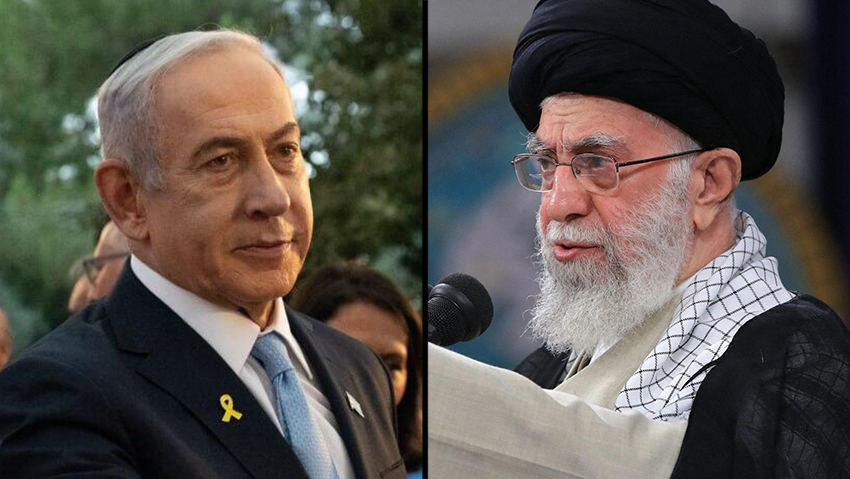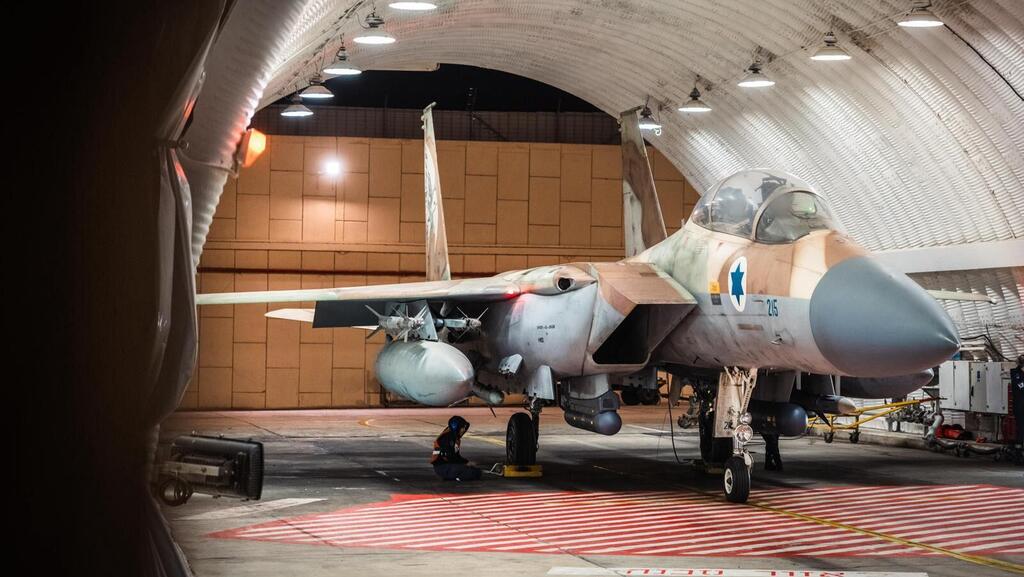Getting your Trinity Audio player ready...
Israel continues to wait for responses from Hezbollah and Iran to the assassinations of top terror leaders in Tehran and Beirut. While the world is making efforts to moderate the Iranian 'Axis of Resistance' and prevent it from reacting in a way that would harm civilians, Hezbollah Secretary General Hassan Nasrallah and Iran's Supreme Leader Ali Khamenei have made efforts in recent days to make it clear that they do not want the current escalation to slide into war.
The messages conveyed by Iran and Hezbollah saying that they do not plan to harm civilians should be taken with a grain of salt by Israel, but the understanding is that neither side is interested in war, and after the retaliatory actions we are likely to find ourselves in the exact same situation as before the assassinations.
But first there may still be several days of fighting, and Hezbollah and Iran are keeping their cards close to their chests - and unlike the last time, it is not clear what exactly the nature of the response will be.
The Iranian axis can choose to respond with separate attacks against Israel, with Hezbollah attacking certain targets, while at the same time (or before) Iran will attack other targets. The Houthis, with whom Israel has an "open account" following the attack in the port of Hodeidah, also are expected to participate in the attack in one way or another, as are the pro-Iranian militias in Syria and Iraq. Nasrallah addressed this in his public speech on Tuesday night, saying that Hezbollah's action could come together with the entire Iranian axis - and could also come separately.
5 View gallery


Hezbollah Secretary-General Hanan Nasrallah addresses the nation
(Photo: Al-Manar TV via Reuters)
"Israel's waiting is part of our response, the battle is also psychological," Nasrallah said Tuesday, adding that "we will act cautiously and carefully." The message conveyed in his speech is that Hezbollah's goal has not changed, which is to prevent Israel from winning the war in the Gaza Strip while not entering into an all-out war with Israel, one that could deal a fatal blow to Lebanon.
In recent days, Russia has also entered the picture , demanding that Iran, according to various reports, avoid an unrestrained reaction - and especially to avoid harming civilians.
55% of Americans oppose sending troops
Israel is currently avoiding making a pre-emptive strike, while various sources have repeatedly stated in recent days that such an attack will lead to a severe response. IDF spokesman Lt. Col. Daniel Hagari on Tuesday told Al-Arabiya that "we have proven that we will not be proportional in our reactions if civilians are harmed. We will not tolerate any harm to civilians. Nasrallah is taking the entire region to an escalation and he will bear responsibility for it. We are also looking at Iran, and we are not alone but with our partners, fully prepared to deal with it. I will not give details to our enemies about our plans."
Defense Minister Yoav Gallant said at Tel Nof air force base Tuesday that Israel is improving readiness to "defend and attack" and is also alert to the possibility that the attack will begin "in a short time."
5 View gallery


Prime Minister Benjamin Netanyahu and Iranian Supreme Leader Ali Khamenei
(Photos: Naama Greenbaum/Haaretz, AFP)
CNN reported on Tuesday that signs of Iranian preparations for an attack are beginning to be detected in the U.S., while in the meantime the situation on the northern border has heated up, with barrages of dozens of rockets and drones toward the Golan and the Galilee, which have led to a great deal of damage and injuries. Israeli experts are working to analyze how Iran and Hezbollah will ultimately choose to respond, and in the meantime they are careful not to play into the hands of the "axis of evil" and there has been no change in the instructions of the Homefront Command that would restrict the public.
Behind the scenes, the U.S. is working together with the countries of the regional coalition to repel the Iranian attack. Biden himself spoke today with the leaders of Qatar and Egypt, and according to the White House he discussed with them "efforts to ease tensions in the region, and bring about a cease-fire agreement and the release of hostages in Gaza."
The U.S. fears that the Iranians have learned a lesson from its attack in April, when 99% of the UAVs and missiles they launched were intercepted. This time, Iran may well use Hezbollah and other affiliates in the region to overwhelm the air defense system. One of the expected difficulties in dealing with the combined attack, according to the Wall Street Journal, is the need to quickly identify the many different targets and decide, in real time, which of them to shoot down. Despite this, commentators estimate that Israel's multi-layered air defense system, large parts of which it developed alongside the U.S., is built for such an event.
5 View gallery


US President Joe Biden in a situation room about the developments in the Middle East
(Photo: Screenshot X platform)
Meanwhile, an alarming survey published in the Washington Post indicates that, for the first time in 14 years, a majority of Americans oppose sending troops to defend Israel in case it is attacked by its neighbors. According to the survey, conducted by the Chicago Council on Global Affairs, 55% of Americans oppose sending U.S. military forces, while 41% support it. Among Republicans, 55% are in favor of sending the forces, while only 35% of Democrats are in favor.
The online survey was conducted from June 21 to July 1, before the assassination in Tehran of Hamas leader Ismail Haniyeh, and Iran's threat of a response that followed. The newspaper noted that the share of Americans who support sending troops is the lowest measured since 2010. In that year, 47% of Americans said they support sending troops.
The scenarios in Israel
Among the targets in Israel the Iranians and Hezbollah may target are symbols of government such as the Knesset, the Prime Minister's Office, the Prime Minister's residence, the Kirya defense headquarters in Tel Aviv, air force bases, intelligence bases, the Mossad base and the Shin Bet base. In addition, there is fear that there will be serious damage to infrastructure sites such as power plants, ports, airports, fuel and ammonia storage, interchanges and main roads. However, Hezbollah and Iran know very well that the Israeli Air Force has the ability to respond strongly to such attacks and fatally damage Iran's oil reserves, for example, or civilian infrastructure in Lebanon.
If Hezbollah and Iran want to harm the civilian population as well and not focus on infrastructure and military facilities, they may also harm city centers in Tel Aviv, Haifa and other large cities. But such an action will almost certainly lead to an escalation that Israel believes they want to avoid and is therefore less likely. Cyber incidents that will try to damage the alert system and disrupt cellular communications also can be expected.
5 View gallery


Israeli embassies around the world could be targeted
(Photo: DCStockPhotography / Shutterstock)
As part of the preparations, the IDF decided to cancel the Holy Ari religious celebration that was planned to take place in Safed between August 8 and 10. In addition, the Canadian Embassy in Israel informed the Foreign Ministry Tuesday evening that it will evacuate the family members of its diplomats to Jordan on Wednesday, the first country to do so. On Monday, Ireland's Foreign Minister Michael Martin called on his country's citizens not to travel to Israel at all.
Another serious concern in Israel concerns the possibility that Iran and Hezbollah will try to carry out attacks against Israelis abroad, or harm Israeli diplomats and Israeli embassies around the world. Therefore, since the assassinations, the Foreign Ministry has declared the highest security alert, similar to the level introduced after October 7. Diplomats have been placed under strict precautionary rules, And some of them were instructed to break their routine, not to attend public events, and to work from home.
"Our situation is very dangerous as far as the envoys are concerned," according to a senior Israeli diplomat, who said that many Israeli representatives feel threatened. "We saw that a person was harmed in a governmental compound, so there is a chance that they will want to damage symbols of government. ... This includes, among other things, our representatives around the world."
"Taking down an embassy or an ambassador is relatively easier," he added. "Definitely the Israeli embassies are a governmental symbol and they are in the crosshairs. The vigilance for the diplomats is really high. There are severe restrictions on their movements. At the same time, we continue to function as usual."
An Israeli ambassador abroad said: "We went on a mission to represent the State of Israel in the good times and also in the difficult ones. It is part of our reality and will probably be the same in the future. You have to be vigilant, follow instructions, take care of family members and the children of the emissaries and take precautions, but I am personally proud to represent the country abroad and these threats will not deter us. On the southern and northern borders the situation is no less dangerous and the citizens of the country and our children are under no less serious threat. We are all at the front, in Israel and abroad, and we will hold the Israeli flag strong and steady and with a confident hand."



